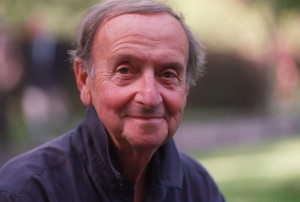I recently watched again the 1973 TV-movie version of Brian Moore’s Catholics. It’s a film much in need of restoration, beginning with the appalling new title attached to it, “The Conflict.” Was the original considered too . . . parochial?
Moore wrote short: there’s economy in his style and many of his novels end abruptly, leaving things unresolved. They often are in life. A book-publishing colleague once asked me to read Cold Heaven (1983), which I praised and told our editorial meeting: “I can’t wait to read the rest of the manuscript.”
The sponsoring editor blushed: “That’s the whole of it,” she said.
Brian Moore was from Belfast but spent most of his adult life in North America – his Christian name is pronounced BREE-ahn – and was one of those Catholic writers who lost faith in Catholicism, but one, as Ralph McInerny put it, “whose Catholicism . . . never lost him.” Moore wrote twenty-seven novels, including The Lonely Passion of Judith Hearne (1955), The Luck of Ginger Coffey (1960), The Emperor of Ice Cream (1965), Black Robe (1985), and The Statement (1995).
Catholics is set in the near future and describes that Sixties bugaboo: the horizontal versus the vertical. The monks at an Irish monastery refuse to follow the dictates of Vatican IV, among which is a directive that the Mass may no longer be said in Latin. The Abbot, Tomás O’Malley (played in the film by Trevor Howard), locks wits with an American visitor from Rome, Father James Kinsella (Martin Sheen), who practices yoga meditation and has come to Muck Abbey with the mandate to bring the “dissidents” into line. Kinsella is filled with joy, such as it is, with news that rebel priests are toppling Latin American governments, and O’Malley takes little joy in anything. The abbot’s choice isn’t between the new, secularized Church and the old, ritualized one but between his own sort of rebellion and his vow of obedience. If the Church, binding and loosing, says Catholics may no longer believe in transubstantiation, how must a man under orders respond?

How can a thing be a miracle one day and not the next? This is the rhetorical question of the monks of Muck (played beautifully by actors including Cyril Cusack, Michael Gambon, and Andrew Keir) and of the people from all over the world who flock to the Irish seaside to see and hear the ad orientem Mass in Latin. And it’s what some Catholics wondered in the wake of Vatican II: with altars pulled from walls; priests turned versus populum; and the faithful shaking hands as at a cocktail party.
Moore lived to witness much of the papacy of John Paul II – enough to see, here and there, the desultory return of the Tridentine Mass. Perhaps through Cardinal Ratzinger’s writings Moore was aware of the man who would become the next pope and who has assured us that Vatican II never directed that the Mass be said only in the vernacular.
When I set foot in a Catholic Church for the first time in 1969, the Mass had become (at least in that church in that college town) a kind of Be-In such as Father Kinsella might have approved. The Catholic girl I was with kissed me passionately during the Kiss of Peace. She was cool with it. I was an aimless Protestant and knew no better.
It wasn’t until 1992 (after I’d been Catholic for twenty years) that I finally attended a Latin Mass – a friend’s requiem, which I could neither understand nor fully participate in. But it was majestic; the choir magnificent. And in the parish I now attend, a young priest celebrates the Tridentine Mass once a month.
But I keep coming back to another of Cardinal Ratzinger’s observations: “The wall of Latinity had to be breached,” he wrote not long after Vatican II, “if the liturgy were again to function either as proclamation or as invitation to prayer.”
I don’t like standing on the wrong side of that wall.
The Tridentine Mass, with its long periods of sotto voce prayers during which most of the faithful stand in confused silence, may as well be in Greek. A few photocopies of the Latin responses are available at our church, but I’ve never been early enough to get one.
Had I been born Catholic . . . But I wasn’t. Had I taken Latin in school . . . But I didn’t. If I thought Latin brought more power and purity to the Mass . . . But I don’t.
Still, I’ve ordered a Tridentine guidebook, and I’ll continue to attend Latin Masses whenever I can, even if only as a kind of time-traveling tourist. All this just in time . . . for the new Roman Missal . . . in English.















